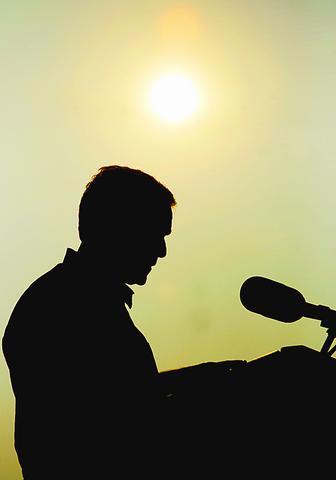Saying he was "living in the future," President Bush promoted his plans for a missile defense system on Tuesday and said that its opponents were putting the nation's security at risk, as he courted aerospace workers in Pennsylvania before rallying supporters in West Virginia.
"We say to those tyrants who believe they can blackmail America and the free world, `You fire, we're going to shoot it down,'" Bush told Boeing employees in Ridley Park, Pennsylvania, south of Philadelphia.

PHOTO: REUTERS
"I think those who oppose this ballistic missile system really don't understand the threats of the 21st century," Bush said. "They're living in the past. We're living in the future. We're going to do what's necessary to protect this country."
Bush did not mention his challenger, Senator John Kerry, by name. Kerry has called for diverting money from developing the missile-defense system, which Democrats say is untested, to pay for expanding the military by 40,000 troops.
The president noted that Boeing engineers helped load the first ground-based missile interceptor into a silo in Alaska last month and called that "the beginning of a missile-defense system that was envisioned by Ronald Reagan."
The administration's plans, which rely on ground-based rockets, are sharply scaled down from the space-based shield envisioned by Reagan's Strategic Defense Initiative and derided in the 1980s as a "Star Wars" system.
Rand Beers, a national security adviser to Kerry, said Bush's "near obsession" with missile defense preoccupied the administration in the months before the Sept. 11, 2001, attacks. Beers said that Kerry believed that an "effective" missile defense was "crucial to our national security strategy," but that he "also understands the importance of facing our most pressing national security threats while continuing to develop and deploy a national missile defense which we know will work."
Bush's trip wrapped up here in eastern West Virginia, near Martinsburg, with a rally before several thousand supporters who did not quite fill a high school football field.
Pennsylvania, which Bush lost by 2 percentage points to Al Gore in 2000, and West Virginia, which he won by 6, are crucial battlegrounds in the election.
Both states have been hit hard by job losses, and the presidential race is neck and neck in both, with Kerry showing slight leads in some recent polls.
The visit to a Boeing plant was Bush's second in five days. On Friday, in Seattle, he said the US would go to the World Trade Organization if necessary to block European subsidies to Airbus, the leading Boeing competitor.
Kerry has said for more than a year that the federal government should subsidize Boeing in response, and his aides accused Bush on Tuesday of doing "too little too late."
The people who crowded into a factory parking lot were all invited, but it would have doubtless been a friendly crowd in any case. Boeing and its employees have given almost US$60,000 to Bush this election year, more than double what they have given to Kerry, according to the Center for Responsive Politics, which tracks campaign financing.

‘TERRORIST ATTACK’: The convoy of Brigadier General Hamdi Shukri resulted in the ‘martyrdom of five of our armed forces,’ the Presidential Leadership Council said A blast targeting the convoy of a Saudi Arabian-backed armed group killed five in Yemen’s southern city of Aden and injured the commander of the government-allied unit, officials said on Wednesday. “The treacherous terrorist attack targeting the convoy of Brigadier General Hamdi Shukri, commander of the Second Giants Brigade, resulted in the martyrdom of five of our armed forces heroes and the injury of three others,” Yemen’s Saudi Arabia-backed Presidential Leadership Council said in a statement published by Yemeni news agency Saba. A security source told reporters that a car bomb on the side of the road in the Ja’awla area in

‘SHOCK TACTIC’: The dismissal of Yang mirrors past cases such as Jang Song-thaek, Kim’s uncle, who was executed after being accused of plotting to overthrow his nephew North Korean leader Kim Jong-un has fired his vice premier, compared him to a goat and railed against “incompetent” officials, state media reported yesterday, in a rare and very public broadside against apparatchiks at the opening of a critical factory. Vice Premier Yang Sung-ho was sacked “on the spot,” the state-run Korean Central News Agency said, in a speech in which Kim attacked “irresponsible, rude and incompetent leading officials.” “Please, comrade vice premier, resign by yourself when you can do it on your own before it is too late,” Kim reportedly said. “He is ineligible for an important duty. Put simply, it was

SCAM CLAMPDOWN: About 130 South Korean scam suspects have been sent home since October last year, and 60 more are still waiting for repatriation Dozens of South Koreans allegedly involved in online scams in Cambodia were yesterday returned to South Korea to face investigations in what was the largest group repatriation of Korean criminal suspects from abroad. The 73 South Korean suspects allegedly scammed fellow Koreans out of 48.6 billion won (US$33 million), South Korea said. Upon arrival in South Korea’s Incheon International Airport aboard a chartered plane, the suspects — 65 men and eight women — were sent to police stations. Local TV footage showed the suspects, in handcuffs and wearing masks, being escorted by police officers and boarding buses. They were among about 260 South

A former flight attendant for a Canadian airline posed as a commercial pilot and as a current flight attendant to obtain hundreds of free flights from US airlines, authorities said on Tuesday. Dallas Pokornik, 33, of Toronto, was arrested in Panama after being indicted on wire fraud charges in US federal court in Hawaii in October last year. He pleaded not guilty on Tuesday following his extradition to the US. Pokornik was a flight attendant for a Toronto-based airline from 2017 to 2019, then used fake employee identification from that carrier to obtain tickets reserved for pilots and flight attendants on three other